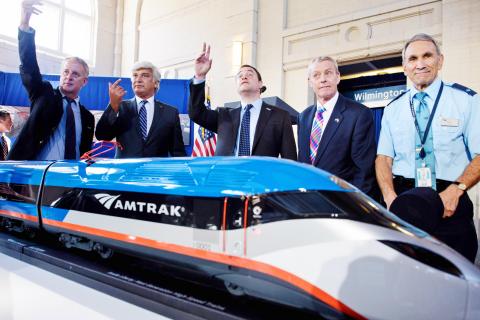US rail operator Amtrak on Friday awarded a US$2 billion deal to French manufacturer Alstom SA to supply new trains for its key Acela service between Washington, New York and Boston.
The landmark deal for 28 new passenger trains is to boost Amtrak’s speed and capacity along its most heavily used and profitable route, with more than 3.5 million passengers a year, from 2021.
The trains are to carry more than 400 passengers, about one-third more than the existing Acela northeastern corridor express service, with a maximum speed of 300kph, although normal speeds are to hover near 260kph.

Photo: AFP
In the deal, Alstom, which makes France’s famed TGV trains, agreed to manufacture most of the new equipment for Amtrak, dubbed its Avelia Liberty line, at its plant in Hornell, New York.
The new trains, which would also serve Baltimore, Philadelphia and other key cities on the 730km route, would be able to run faster than current trains in part due to the use of Alstom’s Tiltronix system allowing the trains to lean more deeply into curves, avoiding sharp slowdowns.
US Vice President Joe Biden, a strong advocate of high-speed rail, said at a ceremony that strengthening the Acela service is crucial, as it serves one of the most densely populated and economically important regions of the country.
“This area from Boston to Washington is home to one out of every seven Americans,” he said, calling the northeast corridor “fundamentally important” to the economy.
Amtrak and Alstom said prototypes for the new trainsets will be ready in 2019, and enter commercial service two years later.
The revamp of the Acela fleet will also be matched by upgrades to stations and the rail line, Amtrak said.

Taiwan Semiconductor Manufacturing Co (TSMC, 台積電) secured a record 70.2 percent share of the global foundry business in the second quarter, up from 67.6 percent the previous quarter, and continued widening its lead over second-placed Samsung Electronics Co, TrendForce Corp (集邦科技) said on Monday. TSMC posted US$30.24 billion in sales in the April-to-June period, up 18.5 percent from the previous quarter, driven by major smartphone customers entering their ramp-up cycle and robust demand for artificial intelligence chips, laptops and PCs, which boosted wafer shipments and average selling prices, TrendForce said in a report. Samsung’s sales also grew in the second quarter, up

LIMITED IMPACT: Investor confidence was likely sustained by its relatively small exposure to the Chinese market, as only less advanced chips are made in Nanjing Taiwan Semiconductor Manufacturing Co (TSMC, 台積電) saw its stock price close steady yesterday in a sign that the loss of the validated end user (VEU) status for its Nanjing, China, fab should have a mild impact on the world’s biggest contract chipmaker financially and technologically. Media reports about the waiver loss sent TSMC down 1.29 percent during the early trading session yesterday, but the stock soon regained strength and ended at NT$1,160, unchanged from Tuesday. Investors’ confidence in TSMC was likely built on its relatively small exposure to the Chinese market, as Chinese customers contributed about 9 percent to TSMC’s revenue last

LOOPHOLES: The move is to end a break that was aiding foreign producers without any similar benefit for US manufacturers, the US Department of Commerce said US President Donald Trump’s administration would make it harder for Samsung Electronics Co and SK Hynix Inc to ship critical equipment to their chipmaking operations in China, dealing a potential blow to the companies’ production in the world’s largest semiconductor market. The US Department of Commerce in a notice published on Friday said that it was revoking waivers for Samsung and SK Hynix to use US technologies in their Chinese operations. The companies had been operating in China under regulations that allow them to import chipmaking equipment without applying for a new license each time. The move would revise what is known

UNCERTAINTY: A final ruling against the president’s tariffs would upend his trade deals and force the government to content with billions of dollars in refunds The legal fight over US President Donald Trump’s global tariffs is deepening after a federal appeals court ruled the levies were issued illegally under an emergency law, extending the chaos in global trade. A 7-4 decision by a panel of judges on Friday was a major setback for Trump, even as it gives both sides something to boast about. The majority upheld a May ruling by the Court of International Trade that the tariffs were illegal. However, the judges left the levies intact while the case proceeds, as Trump had requested, and suggested that any injunction could potentially be narrowed to apply